
Greetings, everyone. Thank you for joining me here at the end of another solar cycle, taking time out of your day to read this meditation on what we did here at Swan River Press these past twelve months.
I confess, for much of it, my attention has been on settling myself in Æon House among other personal matters—trickier prospects than anticipated. In fact, it was only last week that I managed to get the heating installed.
I had the pleasure of showing off the new digs to a few guests this past year too. Despite the bare-bones circumstances, I’m pleased to receive visitors into the incense haze of our yellow brick headquarters. Mind the dust, please. Originally I thought the house dated circa 1906. However, further research revealed that Æon House was in fact built in around 1869, the same year that “Green Tea” was published. Does anyone else’s brain work in this way? Linking dates and years to writers and publications? Suffice to say, I’m delighted by the history that’s already been absorbed by these walls and to which I hope to contribute in the years to come.
Although I am settling in well enough, much of my library and some of the Swan River stock remains difficult to access—and it turns out things may be like this for some time. But for the most part, it’s business as usual. This year saw a considerable increase in production over last year . . .
Our first book of the year, back in January, was Lynda E. Rucker’s third collection, Now It’s Dark. We also published Lynda’s second collection, You’ll Know When You Get There (now available in paperback), and of course she also expertly helmed the third instalment of our Uncertainties series in 2018. As always, it was a delight to work with Lynda—I always admire the way in which she regards weird literature. This profound depth of insight, of course, influences her writing. This recent crop is no exception.
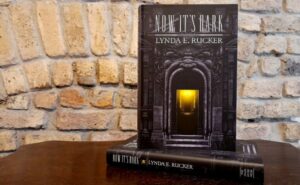 The cover is by John Coulthart. Thinking back now, we’ve done quite a few covers with John. There’s a reason for that. John is always a pleasure to work with; he is as professional as he is inventive.
The cover is by John Coulthart. Thinking back now, we’ve done quite a few covers with John. There’s a reason for that. John is always a pleasure to work with; he is as professional as he is inventive.
Now It’s Dark was received well too, with Rue Morgue noting, “These horrors come from lived experience, brimming with the juices of life and believable characters who are certain to stay with you for a long time. Strongly recommended for lovers of atmospheric, unusual, and slow-burn literary horror.”
If you want to know more, you can read the interview Steve Duffy conducted with Lynda for our website. I hope we’ll be working with Lynda again in the future. How about it, Lynda?
Next up is Agents of Oblivion by Iain Sinclair. Iain had sent this to me with the tentative note, “I’m not sure if you’ll be interested in this . . . ” But of course it was wholly my thing! Check this out:
“Four stories starting everywhere and finishing in madness. Four acknowledged guides. Four tricksters. Four inspirations. Algernon Blackwood. Arthur Machen. J. G. Ballard. H. P. Lovecraft. They are known as ‘Agents of Oblivion’. And sometimes, in brighter light, as oblivious angels . . . As host, as oracle, Iain Sinclair moves through this quartet of tales, through a spectral London that once was, or might never have been.”
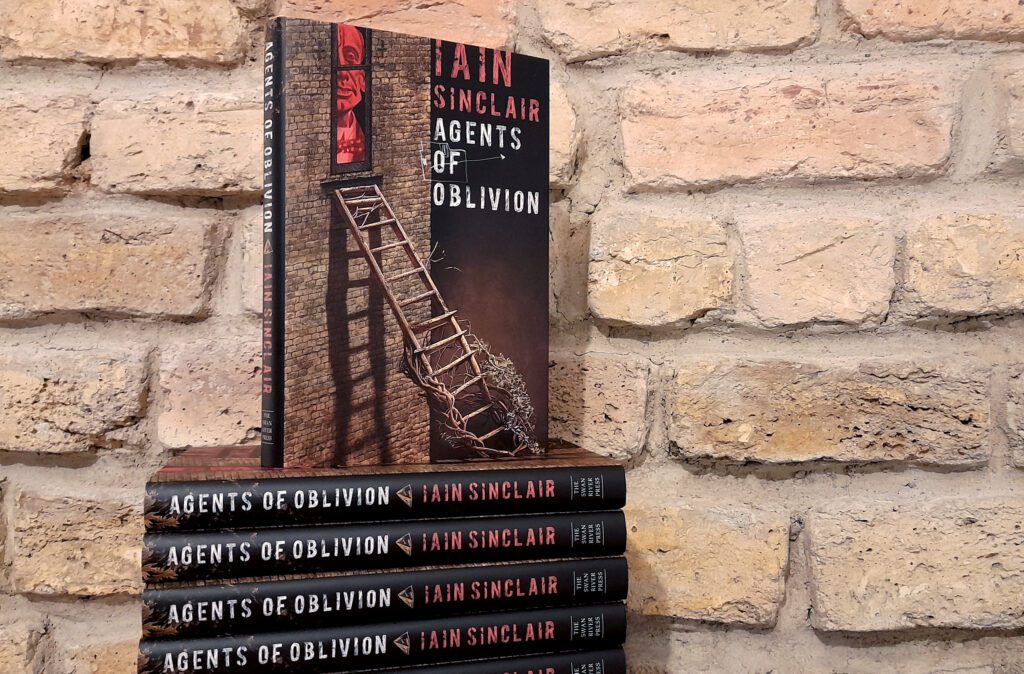 What’s not to love? It apparently was a lot of other people’s thing too, because the entire hardback run briskly sold out. Michael Dirda wrote in the Washington Post, “Nobody can do more with a sentence’s cadence, diction and imagery than Sinclair”; while Michael Moorcock said it was one of the best collections of fiction he had read, going so far so to choose Agents of Oblivion as his Book of the Year in The New Statesman.
What’s not to love? It apparently was a lot of other people’s thing too, because the entire hardback run briskly sold out. Michael Dirda wrote in the Washington Post, “Nobody can do more with a sentence’s cadence, diction and imagery than Sinclair”; while Michael Moorcock said it was one of the best collections of fiction he had read, going so far so to choose Agents of Oblivion as his Book of the Year in The New Statesman.
Not only does Agents of Oblivion feature Sinclair’s writing, but also the artwork of Dave McKean, who is due no small amount of credit for the success of this volume. Thank you, Dave, for another wonderful cover! Matthew Stocker interviewed Sinclair for our website, which you can read here. And never fear: if you missed the hardback, the paperback edition is currently available.
(Buy Agents of Oblivion here.)
Two new titles showed up on my doorstep in mid-July. The first was Uncertainties 6, which I’d started editing way back in 2020. The volume was delayed for numerous reasons, but I’m pleased that readers are now able to enjoy this excellent crop of contemporary strange stories. It’s as strong a selection as ever, and includes contributions from Naben Ruthnum, Alison Moore, Stephen J. Clark, Anne-Sylvie Salzman, and the late B. Catling. SFRevu gave us a kind review, saying that, “Once again [editor Brian J. Showers] has successfully managed to produce an interesting anthology full of dark atmosphere and disturbing plots.”
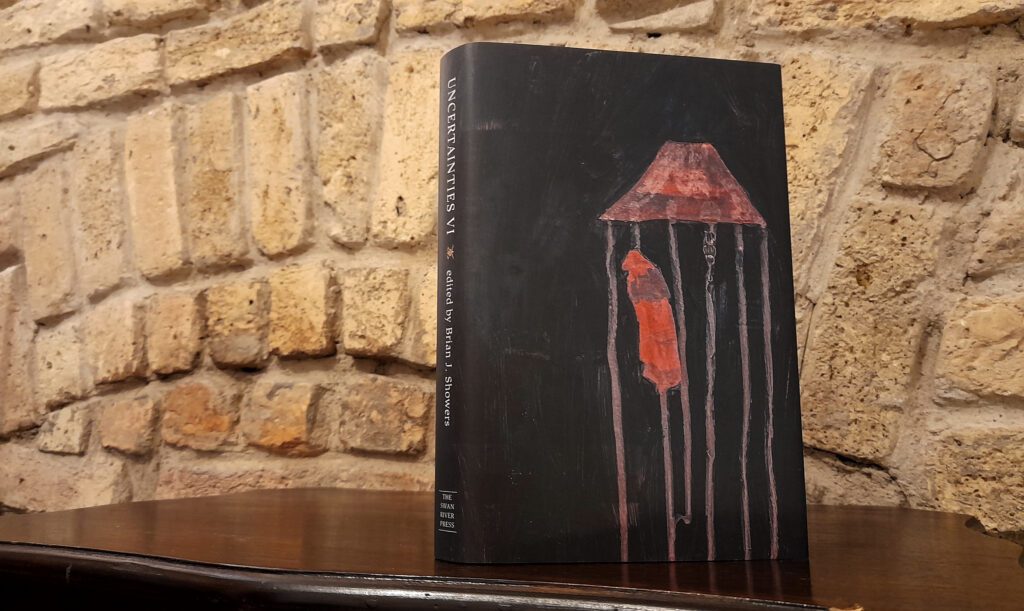 Instead of doing an interview for this volume, which I normally like to do, I instead asked each contributor: “What draws you to write tales in the weird/uncanny mode?” You can read their responses here.
Instead of doing an interview for this volume, which I normally like to do, I instead asked each contributor: “What draws you to write tales in the weird/uncanny mode?” You can read their responses here.
Gracing the jacket and boards of Uncertainties 6 are two paintings by David Tibet from his “Dreams as Red Barn” series. Many will know David from his band Current 93. However, for this collaboration, I prefer to invoke David’s pioneering work with the late Richard Dalby for the Ghost Story Press. Over the course of a decade, Ghost Story Press produced fourteen titles, many of which are now considered classics of the genre. I’ve always seen Swan River as part of this publishing continuum that includes Arkham House, Ghost Story Press, Ash Tree Press, Tartarus Press, and others, all inspirations to fine independent publishing. And so it was a real pleasure to collaborate with David for this book, acknowledging our past and forging a connection to our future.
Arriving on the pallet beside Uncertainties 6 was the debut collection by Timothy J. Jarvis, Treatises on Dust. Having been impressed with his novel The Wanderer, which I’d read many years ago, I was determined to publish Tim’s first collection of stories. Up until this point, Tim had contributed to a number of Swan River titles, including Uncertainties 1, The Scarlet Soul, The Far Tower, and Uncertainties 4 (as editor)—I’m probably forgetting something here too.
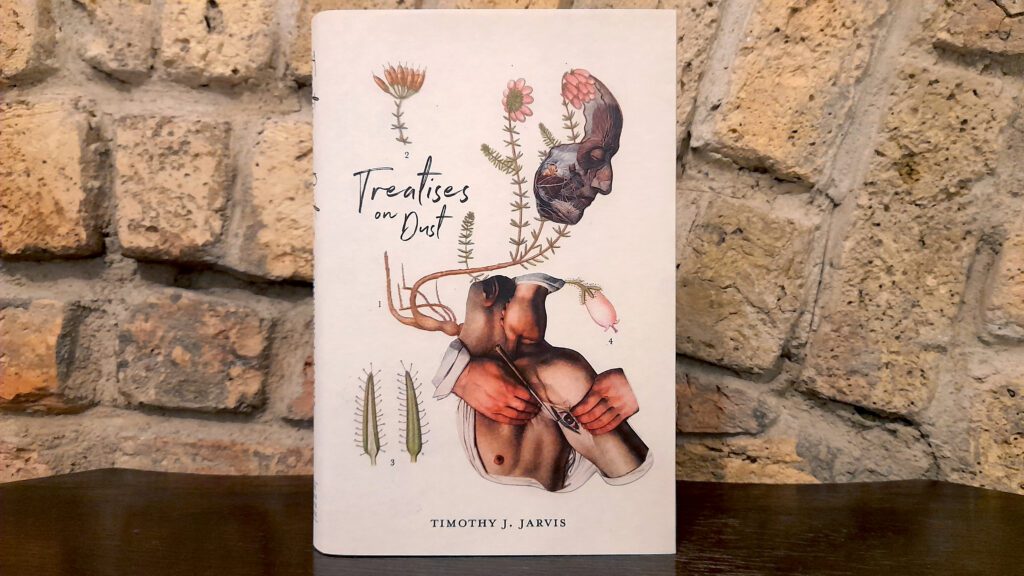 But Treatises on Dust was on another level entirely and I was excited to publish it. In an interview with James Machin about the collection, Tim said, “I admire contemporary writers such as Mark Valentine who have recurring conceits across their stories, also Laird Baron though his is more cosmic in scale—I really like that mythos thing that comes from Lovecraft and other classic weird tales writers—and I wondered what would happen if you did it, but without the cosmicism.”
But Treatises on Dust was on another level entirely and I was excited to publish it. In an interview with James Machin about the collection, Tim said, “I admire contemporary writers such as Mark Valentine who have recurring conceits across their stories, also Laird Baron though his is more cosmic in scale—I really like that mythos thing that comes from Lovecraft and other classic weird tales writers—and I wondered what would happen if you did it, but without the cosmicism.”
This volume, featuring striking artwork by øjeRum, has been one of our briskest sellers this year, with David Longhorn of Supernatural Tales writing, “There is plenty to entertain lovers of weird fiction.” If you’re still not convinced, you should check out the four short films Tim did to promote the book.
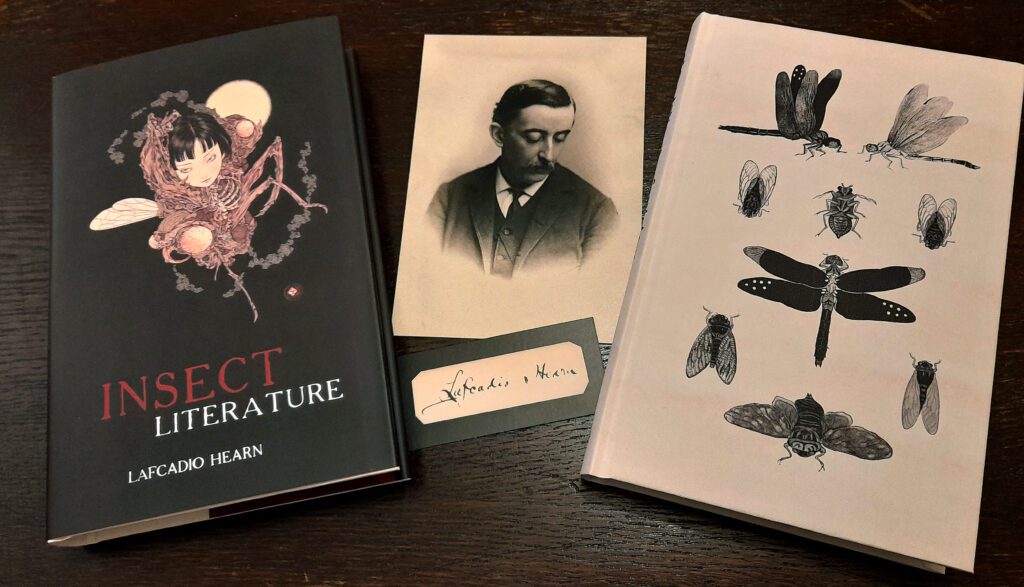 The last hardback of the year was a reprint, something that we rarely do: Lafcadio Hearn’s Insect Literature, originally published in 2015. I’ve always been proud of the design of this book (read about it here), and it’s one that I’m frequently asked about, especially by those who missed buying a copy the first time around. Though the paperback is also currently available, I took this opportunity to make a few adjustments to the new edition, including cleaning up a few formatting issues I was unhappy with, as well as printing the boards on cloth instead of paper. I also issued two new postcards with this edition. So if you missed it the first time around, be sure to pick up the reprint of this fascinating book.
The last hardback of the year was a reprint, something that we rarely do: Lafcadio Hearn’s Insect Literature, originally published in 2015. I’ve always been proud of the design of this book (read about it here), and it’s one that I’m frequently asked about, especially by those who missed buying a copy the first time around. Though the paperback is also currently available, I took this opportunity to make a few adjustments to the new edition, including cleaning up a few formatting issues I was unhappy with, as well as printing the boards on cloth instead of paper. I also issued two new postcards with this edition. So if you missed it the first time around, be sure to pick up the reprint of this fascinating book.
We continued this year as well with The Green Book: Writing on Irish Gothic, Supernatural and Fantastic Fiction.
For Issue 21 we reprinted fiction and poetry, including “The Little Brass God” by B. M. Croker, two macabre stories by Mary Frances McHugh, and a previously unpublished story by the decadent artist Althea Gyles. “The Woman Without a Soul” is a Faustian tale of necromancy and obsession; some scholars have likened “A Woman Without a Soul” to The Picture of Dorian Gray (1890) by Oscar Wilde, whom Gyles befriended in Paris after an introduction from publisher Leonard Smithers. This issue is rounded out by a substantial selection of poetry by Gyles—undoubtedly the most complete collection of her poetry published to date. If you want to learn more, check out the Editor’s Note.
we reprinted fiction and poetry, including “The Little Brass God” by B. M. Croker, two macabre stories by Mary Frances McHugh, and a previously unpublished story by the decadent artist Althea Gyles. “The Woman Without a Soul” is a Faustian tale of necromancy and obsession; some scholars have likened “A Woman Without a Soul” to The Picture of Dorian Gray (1890) by Oscar Wilde, whom Gyles befriended in Paris after an introduction from publisher Leonard Smithers. This issue is rounded out by a substantial selection of poetry by Gyles—undoubtedly the most complete collection of her poetry published to date. If you want to learn more, check out the Editor’s Note.
Issue 22 is a long-overdue Bram Stoker issue, and probably our fastest selling issue since our Lord Dunsany issue. In this issue are pieces by Mike Mignola, the late Leslie Shepard, Stoker biographer Paul Murray, and a recent discovery made by Douglas A. Anderson: a story attributed to Henry Irving that may well bear the hallmarks of Stoker’s own pen. Again, read the Editor’s Note if you want to know more. Better yet, pick up a copy of the issue and see what you think yourself.
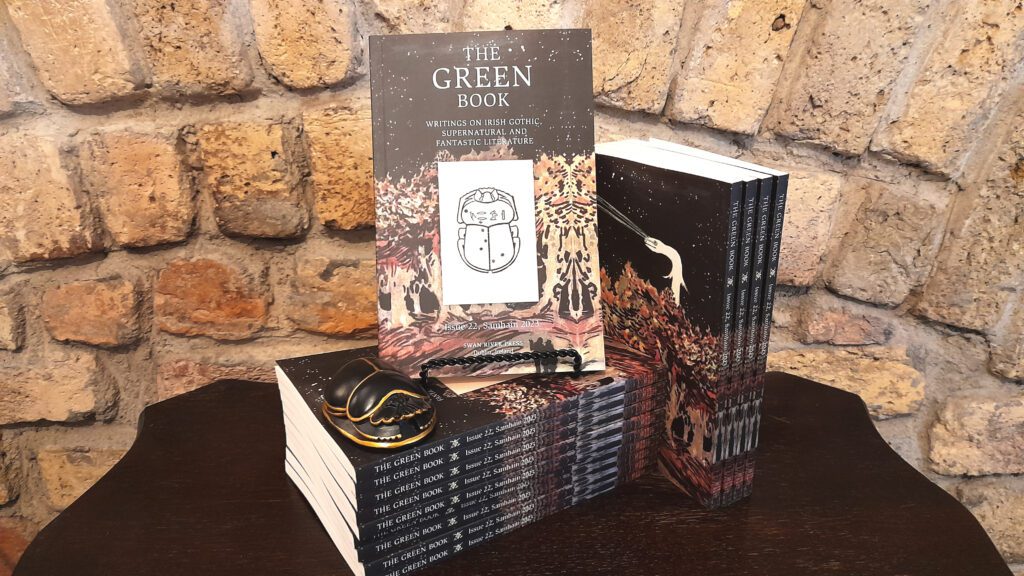 We had a few paperback publications this year too, and I believe most of our back catalogue, save for contemporary anthologies, is now available in this format. Let’s see . . . we’ve got:
We had a few paperback publications this year too, and I believe most of our back catalogue, save for contemporary anthologies, is now available in this format. Let’s see . . . we’ve got:
Old Hoggen by Bram Stoker
Lucifer and the Child by Ethel Mannin
. . . and, of course . . .
Agents of Oblivion by Iain Sinclair
For those interested in statistics, we published 6 new titles this year, totalling 1,112 pages; 2,325 copies; and 297,895 words. That includes this year’s issues of The Green Book, but not Insect Literature or the paperback reprints.
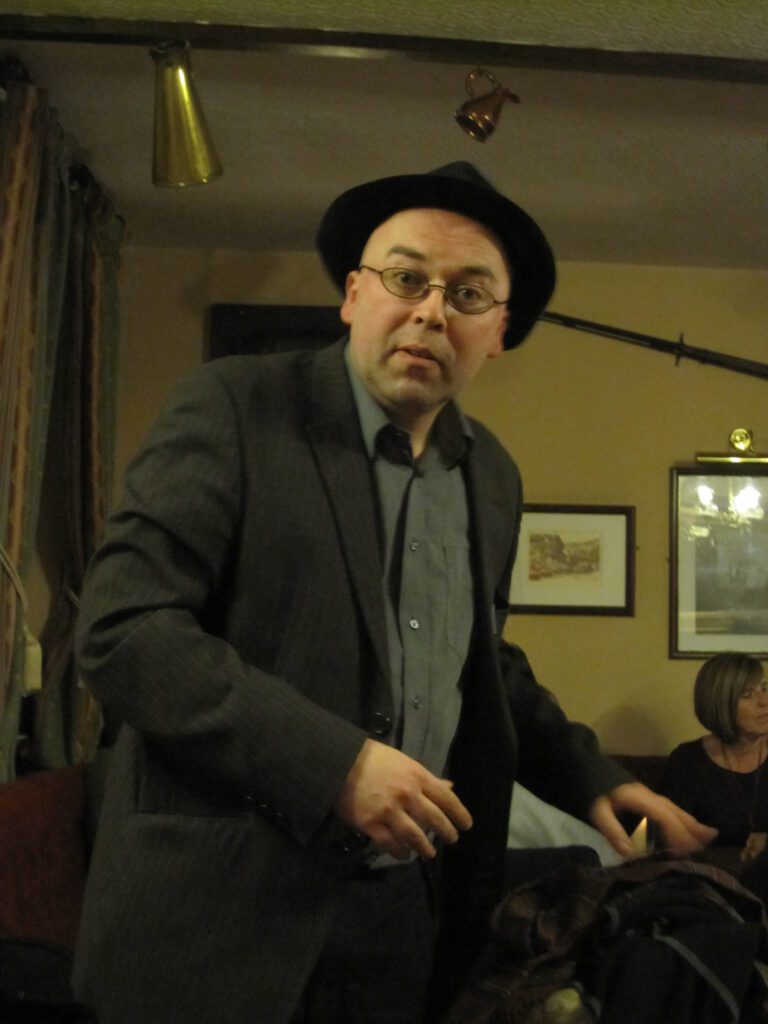 Unfortunately, as many already know, the weird horror community lost Mark Samuels earlier this month. I read Mark’s work in his superb collection The White Hands (2003), the first and only book I bought at Fantasy Centre in London—the hardback Tartarus edition, signed by Mark in green ink. I read it in Sweden. I enjoyed it immensely, and so anticipated Glyphotech (2008), which did not disappoint. In my review for Rue Morgue, I wrote, “Yes, his work can probably be shunted into the urban horror genre, but within this definition he manages a great deal of diversity, and a clear writing style free from over-indulgent descriptions of decay. In Samuels’s world we find misanthropic outcasts, polluted realities and grotesque caricatures that imitate the man-made.”
Unfortunately, as many already know, the weird horror community lost Mark Samuels earlier this month. I read Mark’s work in his superb collection The White Hands (2003), the first and only book I bought at Fantasy Centre in London—the hardback Tartarus edition, signed by Mark in green ink. I read it in Sweden. I enjoyed it immensely, and so anticipated Glyphotech (2008), which did not disappoint. In my review for Rue Morgue, I wrote, “Yes, his work can probably be shunted into the urban horror genre, but within this definition he manages a great deal of diversity, and a clear writing style free from over-indulgent descriptions of decay. In Samuels’s world we find misanthropic outcasts, polluted realities and grotesque caricatures that imitate the man-made.”
Although I’d met Mark a number of times over the years—he always happily inscribed his books for me too!—I most fondly remember one carefree summer (remember those?) a personal walking tour of Machen’s London, followed by pints at the Clifton Hotel in St. John’s Woods, a pub not only frequented by Machen, mentioned in The London Adventure, but one that features in a memorable photograph of the Welsh writer. Mark and I dutifully recreated that photo.
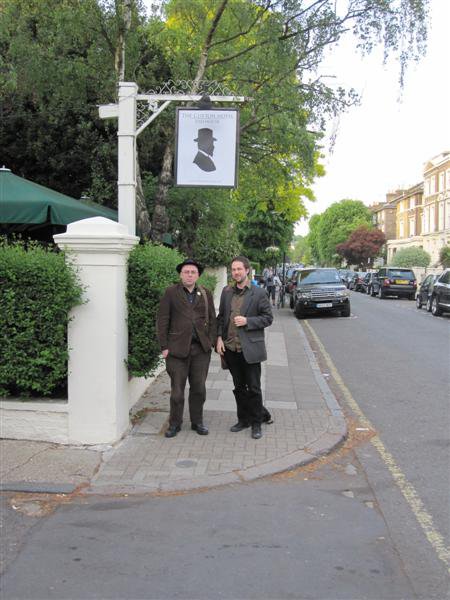 I’d only had the pleasure of publishing Mark once: “The Court of Midnight” in Uncertainties 2 (2016), later collected in The Prozess Manifestations (2017). Mark was consistently an excellent writer of weird fiction and has left us with a substantial body of work to be explored. If you’re not familiar with his writing, perhaps the easiest way to sample it is by picking up a copy of Hippocampus Press’s The Age of Decayed Futurity: The Best of Mark Samuels. You might also be interested in reading Quentin S. Crisp’s tribute to Mark as well.
I’d only had the pleasure of publishing Mark once: “The Court of Midnight” in Uncertainties 2 (2016), later collected in The Prozess Manifestations (2017). Mark was consistently an excellent writer of weird fiction and has left us with a substantial body of work to be explored. If you’re not familiar with his writing, perhaps the easiest way to sample it is by picking up a copy of Hippocampus Press’s The Age of Decayed Futurity: The Best of Mark Samuels. You might also be interested in reading Quentin S. Crisp’s tribute to Mark as well.
Farewell, Mark. Raising a pint to you!
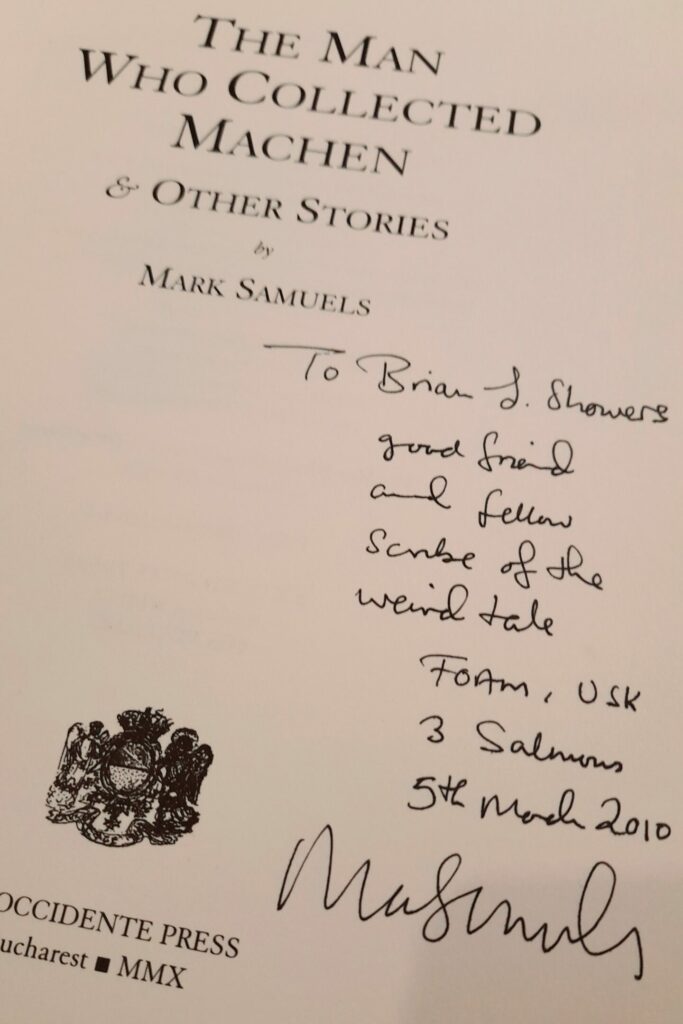 In less mournful news, Swan River Press celebrated its twentieth anniversary this October. The occasion came and went pretty quietly, if only because I was otherwise occupied to plan a proper commemoration. However, I did write a short blog post on the history of the press. So for what it’s worth, here it is. One of these days I’ll finish writing that Swan River bibliography . . .
In less mournful news, Swan River Press celebrated its twentieth anniversary this October. The occasion came and went pretty quietly, if only because I was otherwise occupied to plan a proper commemoration. However, I did write a short blog post on the history of the press. So for what it’s worth, here it is. One of these days I’ll finish writing that Swan River bibliography . . .
Of course, as always, I am grateful to the Swan River Press team: Meggan Kehrli, Jim Rockhill, Steve J. Shaw, and Timothy J. Jarvis. These folks help keep things running smoothly and our books looking the best they can be.
Before I retire to the warmth of my reading mattress (I don’t have a reading chair just yet), I would like to thank everyone who supported Swan River Press this year. Those of you who bought our books, posted about us on social media (we’re on Bluesky now too), sent feedback (especially if you’ve felt inspired by something you’ve read), or showed up on the doorstep of Æon House. Thank you, thank you, and thank you! Until then, please stay healthy; take care of each other and your communities. I’d like to wish you all a restful holiday season, and hope to hear from you in the New Year!
Brian J. Showers
Æon House, Dublin
10 December 2023


I am new to Swan River Press this year, Brian. It has been exciting to discover the wonderful catalogue of literature, and explore around Dublin sourcing your books. Agents Of Oblivion is fantastic. It has been lovely to have the odd conversation with you in the last six months. All the best for 2024.
Thanks, Scott! You’re very kind! I’m delighted to hear you enjoyed Agents of Oblivion! More where that came from . . .